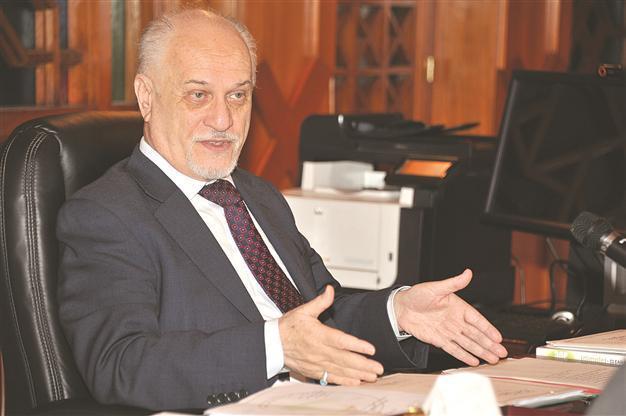Baghdad welcomes KRG oil, gas agreements with Turkey
BAGHDAD/ANTALYA– Anadolu Agency

'We support and seek to increase our oil and future natural gas exports to Turkey,' al-Shahristani told Anadolu Agency in an interview. AA Photo
Iraqi Deputy Prime Minister for Energy Hussain al-Shahristani has welcomed recent agreements between Turkey and the Iraqi Kurdish administration on oil and natural gas exports to Turkey, provided that the central government in Baghdad is not marginalized in any such agreements.“We support and seek to increase our oil and future natural gas exports to Turkey,” al-Shahristani told Anadolu Agency in an interview. “This is something that we seek to achieve.”
However, al-Shahristani stressed that the quantities of Iraqi oil exported to Turkey must be known to the central government, oil must be sold at international market prices, and revenues from oil sales must be channeled to the account of the Iraq Development Fund in New York, in line with previous U.N. Security Council resolutions.
Crude test flows begin
Meanwhile, Turkish Energy Minister Taner Yıldız told reporters on Dec. 14 during his visit to Antalya that test flows in Iraqi Kurdistan’s crude oil pipeline to Turkey had started, adding that one of the pipelines had not been working for a long time and was thus being tested.
“In order to understand destruction and corrosion in the empty pipeline, we sent crude [from northern Iraq]. We sent crude to the existing tanks there. We made our first attempt today, and there haven’t been any problems yet,” Yıldız said.
He visited Iraq two weeks ago to discuss means of bringing energy cooperation between Turkey and Iraq back to normal after a two-year chill. The Turkish government has signed a package of oil and natural gas deals with the Kurdistan Regional Government (KRG) of northern Iraq, which will bring Iraqi oil and natural gas to international markets via pipelines crossing Turkish territory.
A Turkish company will start working on 13 different sites in the Iraqi Kurdish region, while an oil and natural gas pipeline will help raise oil exports from the KRG to a million barrels a year. Exports are due to commence in 2017.
Turkey needs more oil
Al-Shahristani said Iraq was mindful that Turkey needed more oil to keep the engine of its economic and industrial growth going. He also stressed that apart from being a major oil exporter, Iraq would soon become a major natural gas exporter as well.
“Iraq views Turkey as an important neighbor with whom it has historic relations. We view relations with Turkey through the prism of integration, not only cooperation in specific fields,” al-Shahristani said.
He went on to emphasize that decisions on oil and natural gas exports must be made by the elected Iraqi government because oil and natural gas resources were owned by the Iraqi people, not by a specific region. He also welcomed what he described as the desire of KRG officials to sit with central government officials to settle pending disputes, particularly on oil.
Al-Shahristani said his government was keen on solving pending disputes in accordance with the conditions it set for the exportation of Iraqi oil.
He also noted that Ankara was seeking to encourage Turkish companies to work in Iraq. “We told them that Iraq has an ambitious plan to diversify its exports. We do not want to depend on one source only,” al-Shahristani said.
Responding to reports that Baghdad had restricted visits by Turkish officials to the Kurdish region, al-Shahristani said foreign officials always needed to get permission from the central government first.
“Any foreign official seeking to visit any part of Iraq on an official visit must first contact the foreign ministry. Iraq does not allow planes carrying foreign officials to cross its borders without official permission from the foreign ministry,” he said, adding that the Baghdad government was keen to deliver the same message to Yıldız during his recent visit.
He said Yıldız had been told that he was most welcome in the capital first and was then he free to visit any region in Iraq.
“This applies to all foreign officials who visit our country on a formal visit,” al-Shahristani said.
















